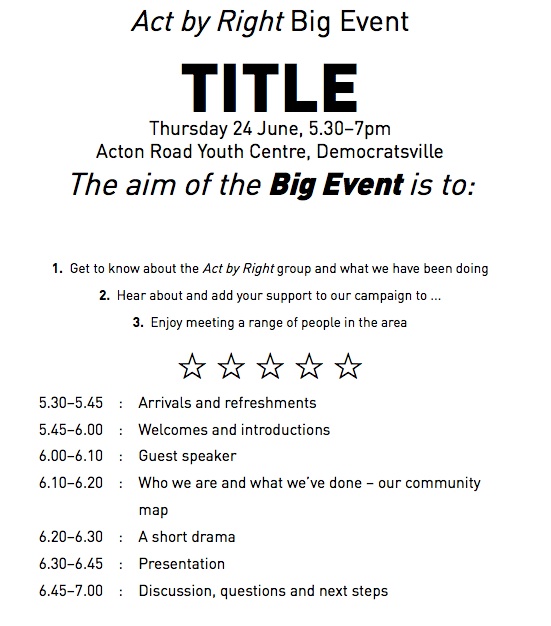4.3(b) The Big Event
Aim
To plan an event designed to raise awareness and support for the campaign and the work of the group.
You need
Flipchart, pens, post-its, activity sheet 30 and about an hour and a quarter.
What to do
Holding a Big Event or launch is a great method of getting your views across to the people who count, building relationships, support for your campaign and promoting the work of the group as a whole. But it needs a lot of careful planning to make sure they come and everything goes smoothly.
You may or may not need to actually put on a Big Event as part of your campaign. It is important though for the learning in this unit to think through this activity as it brings together much of your work so far. For some of you, this activity may be best as the very last thing you do – as the concluding celebration for completing the whole workbook. This might link to an awards ceremony. And certainly, the learning from Unit 5: Finding out what's changed about evaluation can be built in very effectively into the Big Event.
If planning a Big Event for 30, 70 or 100 people feels daunting, look at what you have already done towards it. You are strong as a group and know your community well. You may have the best community map around. You have built bridges and developed relationships with a range of groups. You are clear about your aims and have created a strong message about what you are seeking to achieve. You know what you want to say and you have a large number of methods to draw upon to get your message across. You know who to invite to the Big Event and what you are hoping for from them. There is just the small matter of putting the practical arrangements in place, planning the day and practising to make it perfect.
a) The first task is the practical planning. Do a word storm of all the things that may need to be done. Be really clear about the aims of the event – things you want to get out of it. Keep going till you have run out of ideas, have a break and come back to check you haven’t missed anything. The next thing is to make some sense of it and agree priorities. See how your list and priorities compare with the example below. You can use activity sheet 30 to help with your planning. Add in your own details and anything else you need.
Top ten things to do list
| What needs to be done | |
|---|---|
| 1. Aims of the event a.Title b. Outline c. Who for | 6. Invitations a. Produce b. Send out c. Collate replies |
| 2. Money and donations a. What we need b. Sources c. Support in kind | 7. Materials for event a. Programme b. Map c. Presentation d. Workshops e. Feedback forms |
| 3. Venue a. Dates b. Numbers c. Access d. Insurance e. Cost | 8. Distribute materials a. Print b. Circulate c. Prepare packs |
| 4. Content of event a. Guest speakers b. Presentations c. Workshops d. Chair | 9. Practical arrangements a. Refreshments b. IT c. Seating d. Access e. Publicity |
| 5. Confirm arrangements a. Venue b. Guest speaker c. All other participants | 10. Working groups a. Who b. When to meet |
b) The second task is to agree the programme for the Big Event. Compare it with a journey. You have to get to your destination on time, as people get very frustrated when events run over. Think carefully about how long each bit will last. And think through the exact content of each stage of your journey. Below is an example of an outline for you to consider.
c) And finally, set up working groups and agree who is going to do what. There is a lot to think through. For example, those tasked to sort out refreshments: where can you get free supplies? Should each member of the planning group bring something like milk or biscuits? Should there be a rota for serving refreshments? It can also work well to involve groups who you want to attend in the planning and in the programme itself. It can increase their interest and commitment. Are there particular people you want to include in this way? But things rarely go to plan. What’s the back up? Do you need a core group to make sure all the planning from the working groups is going ahead okay? What about regular meetings in the build up to spot any possible problems and deal with them?
What do you think?
In the build up to the Big Event, make sure you practise your own part. And it’s always a good idea to do a full dress rehearsal in front of a friendly audience, which is also prepared to offer constructive advice. This will give you a flavour of what it will be like to speak in front of your real audience. Could everyone hear? Did the technology work? Did the whole thing run to schedule?

